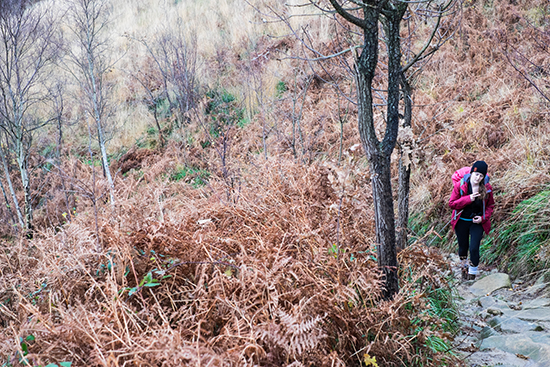A Trek through the Anthropocene

Fern-choked hillside on a lovely stretch of the Camino de Santiago. © John Reid
I spent five days in December walking through Spain's Basque Country on the northern variant of the ancient pilgrimage route to Santiago de Compostela. And also walking through the Anthropocene, a geologic era recently declared by non-geologists to describe our time, an epoch in which people shape the earth more than plate tectonics or asteroid collisions.
With my wife and two kids I walked over bright green fields, though towns, forests, farms and along every sort of path, byway, track, road and highway. It's a lush country, and wet. And cold. People don't walk here in the winter - we saw only two other pilgrims in a week and weathered suspicious glances from the few Basques we encountered outdoors. But the empty trail gave me time to think and look around.
What I saw was a landscape I can best describe as scruffy, with lots of edges and a proliferation of plant life. Things like ivies, eucalyptus, pines in wobbly rows, vast thickets of blackberries and an array of plants opportunistically growing in ditches, along fences, road cuts and rock walls.
This isn't to say the place isn't scenic. Its hills and coves and fluffy sheep and ancient town centers are astonishing. But I had the sense I was walking through a great accidental garden of exotic species (species brought to the region from elsewhere). I looked it up when I got back and, indeed, the Basque government issued a report in 2009 on invasive exotics because of the threat posed to native flora. The report estimated that a fifth of the region's species were exotics and that a fifth of that total were the out-of-control "invasive" species that can carpet great swaths of the landscape.
This is the Anthropocene and it didn't start yesterday. Scientists are debating when exactly to start the clock on this era, with the arguments summarized in this Huffington Post entry from today. I care less about the start date than the attitude with which we inhabit the new period. Some people have breathlessly declared that the Anthropocene is now underway because people are, finally, really driving the planet and that, in a way, that's cool because we're in change of determining our own destiny with smart technology and human ingenuity. No longer the passive passengers and mere result of the Earth's evolutionary swirl.
As I trudge through an ecologically out-of-control landscape where people have been the dominant force for many centuries, I have a hard time buying into the idea that we're any more in control than we were when American exotics started stowing away on ships returning to Spain in the 16th Century. Or that, even when we do change the environment on purpose, we have much clue what the ultimate outcome will be.
The idea, embedded in the Anthropocene myth, that people need to actively do stuff to keep the planet healthy is good. It's all about responsibility. About using our big brains and cooperative skills to leave space for a wide array of species, even the useless and unfarmable. The giddy notion that we're entering the post-Nature era, in which people will competently garden the whole planet is belied by a few days walking in a corner of it where we've been gardening the longest.
- Log in to post comments
